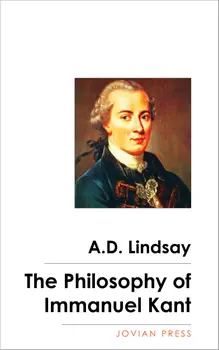It is a difficult matter, says Heine, "to write the life history of Immanuel Kant, for he had neither life nor history. He lived a mechanically ordered, abstract, old bachelor kind of existence in a quiet, retired alley in Königsberg, an old town in the north-east corner of Germany." The times he lived in were stirring enough. He was born in 1724, and died in 1804. He lived through the Seven Years' War that first made Germany a nation, he followed with sympathy the United States War of Independence, he saw the French Revolution and the beginning of the career of Napoleon. Yet in all his long life he never moved out of the province in which he was born, and nothing was allowed to interrupt the steady course of his lecturing, studying, and writing. "Getting up," continues Heine, "drinking coffee, lecturing, eating, going for a walk, everything had its fixed time; and the neighbours knew that it must be exactly half-past four when Immanuel Kant, in his gray frock-coat, with his Spanish cane in his hand, stepped from his door and walked towards the little lime-tree avenue, which is called after him the Philosopher's Walk." "Strange contrast," reflects Heine, "between the man's outward life and his destructive, world-smashing thoughts." As the political history of the eighteenth century came to an end when the French Revolution spilled over the borders of France and drove Napoleon up and down Europe, breaking up the old political systems and inaugurating modern Europe, so its opposing currents of thought were gathered together in the mind of a weak-chested, half-invalid little man in Königsberg, and from their meeting a new era in philosophy began...
0.0(0)
The Philosophy of Immanuel Kant
Author:
Format:
Duration:
- 52 pages
Language:
English
